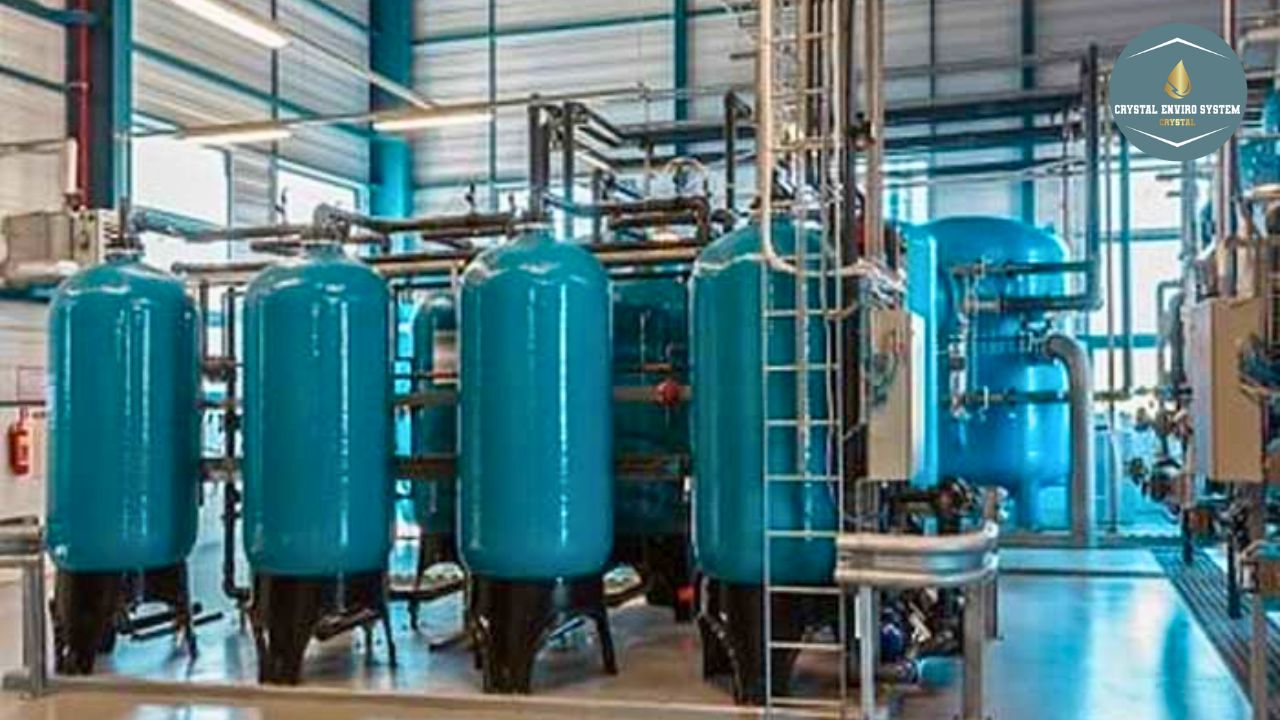What is Industrial DM RO Water Treatment Plant?
The abbreviation “DM” stands for demineralized water. Natural water contains ions with positive and negative charges, known as anions, which are minerals and salts. These substances can lead to oxidation and the formation of scale on metal surfaces. Demineralization (DM) plants are specifically designed to eliminate these ions, producing water free from minerals. This process selectively permits certain minerals to pass through, resulting in a final product with a pH value of 7.0. Nevertheless, DM plants are not flawless, highlighting the importance of understanding their capabilities.
DM plants come in two fundamental types: single-unit and column configurations. In a mixed-bed demineralization plant, a solitary ion exchange resin is employed to treat water, and a single unit runs water through resins to eliminate cations. The second variety, a supercharged mixed bed DM unit, channels water through a dual-bed setup. This approach yields a remarkably pure end product with heightened levels of purity.
A DM RO water treatment plant designed for industrial use boasts numerous benefits. It effectively minimizes the formation of scale and deposits within pipes while safeguarding turbine blades against mineral buildup. Additionally, this system exhibits exceptional proficiency in purifying groundwater. Acroama, a renowned name in the field, stands out as the premier option for industrial applications. With an extensive array of DM water plants, the company provides a comprehensive selection to cater to diverse needs.
What is Industrial DM RO Water Treatment Plant?
The DM unit represents an alternative form of an industrial RO water treatment plant. This unit employs a unique amalgamation of various ion exchange resins within a single ion-exchange column. While the procedure is more intricate, it yields superior water quality as an outcome. The DM unit effectively combats the development of scale and corrosion within pipelines, rendering it particularly suitable for generating ultrapure water. Whether the purpose is industrial applications or potable consumption, the DM plant proves to be a reliable and efficient solution for fulfilling the task at hand.
A DM plant serves as an industrial RO water treatment facility, primarily designed for the treatment of groundwater. These plants offer enhanced efficiency compared to dual-bed units and excel in the extraction of dissolved solids from water. Noteworthy advantages of such DM plants encompass the capacity to diminish scale and sodium content. This approach represents the optimal means of ensuring the efficacy of your DM system. When deciding upon an Industrial DM RO Water Treatment Plant, it’s essential to opt for the one that aligns most fittingly with your specific requirements.
DM plants serve a purpose beyond producing drinking water; they are also instrumental in removing cations and ions from wastewater. This action effectively thwarts the development of scale within pipes and offers water quality superior to that of distilled water. The versatility of the DM system extends to application across diverse industries.
A DM plant finds utility in both industrial and laboratory settings. Its complexity surpasses that of a single-bed unit, thereby contributing to a higher cost. An investment in an Industrial DM RO Water Treatment Plant translates to an investment in the future of your business, with the expenditure proving to be worthwhile. The advantages associated with a DM Plant are indeed plentiful.
The advantages of a DM plant are manifold. It exhibits the capability to rapidly purify substantial water volumes within a concise timeframe. The mixed-bed system surpasses the single-bed system due to its heightened efficiency in removing dissolved solids. Additionally, it effectively curtails the accumulation of scale in pipelines and contributes to the prolonged operational lifespan of equipment like boilers.
The primary advantage of a DM Plant lies in its proficiency at eliminating dissolved solids. This capability extends to minimizing scale accumulation, averting corrosion, and enhancing overall water quality. Moreover, it effectively addresses the accumulation of calcium and magnesium on the turbine blades of air conditioning systems. The efficacy of the DM Plant is contingent on the quantity of sodium employed. Furthermore, it serves as a superior solution for reducing acidity, resulting in water that not only possesses improved taste and smell but also exhibits enhanced overall quality.

